Harvest Moon: A Wonderful Life
"Get a life," we're often told. Probably the best advice we've ever had.
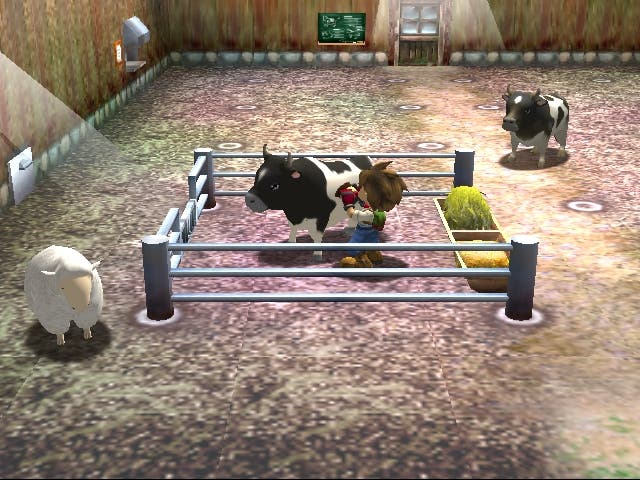
Open-mindedness is the key to a long and healthy gaming life. Some of you are bound to agree with that - and we're guessing that anybody who does also took a chance on ICO, Viewtiful Joe, Mario & Luigi, perhaps even Gregory Horror Show, and in doing so bucked the growing trend of safety first when it comes to buying videogames. And it is a growing trend. And a worrying one. These days the charts are crammed full of the very rubbish we're supposed to be trying to avoid, and the laughable part is that we're going out and buying this stuff because we're unwilling to take risks on games we're unfamiliar with. It didn't used to be like this. Once upon a time, "I don't like RPGs" wasn't even intelligible English. These days it's common. Plug it into Google. Plug in a few variations. Cry.
Harvest Moon: A Wonderful Life is one of the best possible ways to break this depressing cycle, and break it we must. Unless you picked up any of its predecessors on other platforms, the chances are you own nothing like it. Some have labelled it an RPG, some call it a farming simulation, but in truth it's one of those delightful games that shirks classification by delivering strategy, simulation, role-playing and all manner of other concepts with such harmonious precision that its epic length - literally hundreds of hours from the start to one of several possible end sequences - counts far more in its favour than anything else. It's also one of a very few lengthy games that manages to remain fresh, appealing, and above all understandable at whatever pace you choose to play it.
Good. You're still reading. You've taken the first step. Now try to imagine an idyllic rural community nestled in a sunny valley on the coast of a beautiful island. Think of the simple life; toiling in the fields, visiting friends in town, fishing in the river, and gradually building up a healthy family, going home every night in the pitch black and lying down with an expression of true contentment plastered across your jaw. Each day isn't that different to the last, but each day is full of tasks you're used to and competent at, the chance to take small risks building up your business, and little moments of exquisite joy as carefully sown plans literally bear fruit, and give you the chance to expand and enrich your already comfortable and satisfying lifestyle. And if you ever get bored of playing business-savvy farmer, you can always retire to the pub for an afternoon to shoot the breeze with the regulars. Who knows - you might learn something.
Moon shine
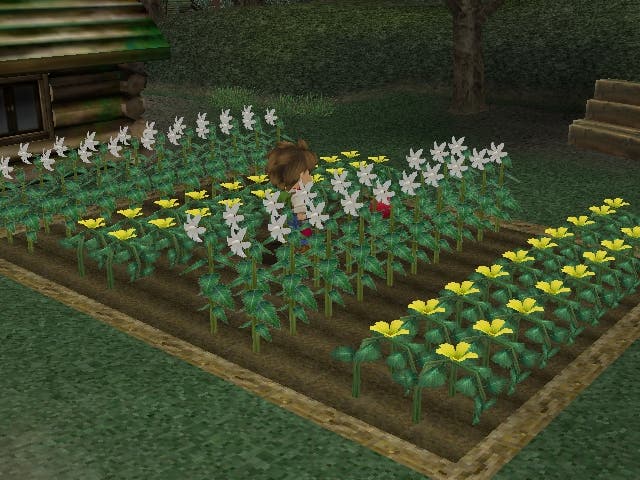
This morning, Roy the farmer got up at 5am. It was raining, and the TV didn't have anything encouraging to offer on the subject (even the horoscope was depressing), but by the time Roy made it to the cattle shed and milked Ellie he was munching on some Royal Fern he'd found growing wild behind the dog kennel, and feeling all the better for it. With the milk deposited in the storage room for Takakura to take to Mineral Town and sell, he marched over to the henhouse with an extra spring in his step and put some birdfeed out, before making the short trip across the bridge and onto the neighbouring farm to say hello to his fiancé Celia. She was pleased to see him of course, and seemed extremely happy when he surprised her with a strawberry picked just a few hours earlier.
Harvest Moon may be about farming, but it's also about living. It's a simplified version of a rustic lifestyle, stripped down to a number of well judged and balanced tasks that complement each other and more than fill up the hours of the day, which tick by at a rate of one every minute. Having inherited a small farm from your father, you set about building it up with the help of his friend Takakura, who will take your dairy produce into town every day and return with cash. In the meantime you'll get to know the people of Forget-Me-Not Valley, most of whom have something interesting and pertinent to say. You'll carve out mutually beneficial relationships with them; relationships that may be of use way down the line - like when you're trying to help your offspring pick out a career - and you'll generally live and learn, plying a demanding trade without feeling pressured, and every night going home satisfied that even if you made a few poor choices, there's always tomorrow to make amends.
You'll find new revenue streams for your farm. You'll realise that while growing fruit and veg and selling it on a stall in the centre of town can earn you a few hundred G, catching a few exotic fish by carefully researching the best fishing spots will make more money in the short term, allowing you to save up and buy the kit that you need to produce and sell your own seeds and earn more cash that way. There are mundane tasks to complete, but even as you literally toil away at a field, turning over the soil of each square individually, planting seeds and watering them, and then returning to top them up when the soil looks parched, you're strangely motivated to keep doing it. Perhaps not at first, but by the end of the first couple of seasons in Forget-Me-Not Valley you'll be growing and watering your crops whether you really have to or not.
Time to fill
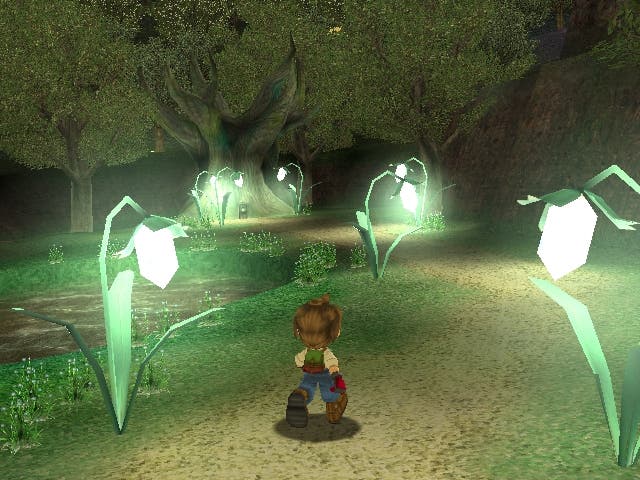
Leaving Celia to her chores, Roy walked up the hill, smiling ear-to-ear, and started fishing under the waterfall. Someone in town mentioned that fishing spots varied in their effectiveness, and after a few days supping on the rather sickening Colombo fish from under the bridge, the taste of Huchep and Rainbob was welcome - and they ought to go for a decent amount in town, too. Strolling back to the farm, fish slung in his expansive rucksack, Roy noticed the sun coming out. So the forecast was wrong. Oh well. Bringing the chickens out one by one, his spirits were raised again by the sight of a pair of eggs, one of which his freshly purchased rooster had managed to fertilise.
It helps that you share your farmer's goals in your own life - you'll courteously pursue one of three potential brides, lavishing them with attention, and listening to them so that you'll be able to woo them most effectively. With each extra heart in a girl's diary, she'll be more likely to say yes when you eventually propose, and when she says yes you'll feel like the king of the world. She may only have a few choice things to say in a given season, but somehow the gentle pace and tranquil setting leave your imagination free to run riot and fill in the blanks. It's hard to believe that you won't bore of the same lines of dialogue, but you won't, perhaps because Harvest Moon is the sort of world that you really wish you were living in. It paints a picture of a lively and engaging way of life. You'll envy the simple pleasures, all the while Forget-Me-Not Valley's natural equilibrium means you're never too well off, but you're also never that close to abject poverty. Animals can die if you ignore them, and you will make mistakes, like planting seeds in the wrong season, or accidentally leaving the cows out overnight, but you're always safe from real disaster.
That's not to say it's a game without challenge, however. Turning the ranks of cattle into a thriving dairy business, for example, involves lots of hard graft and careful attention paid to each animal, and on the social side courting a young lady is really only the beginning. The game is split into six chapters, some of which are spread over several years (each of which encompasses about 20 hours of gameplay in four 10-day seasons), and there are certainly more things to worry about in the latter years, including your wife and child. Cleverly though, the added task of raising the nipper and helping him choose a path in life is offset somewhat by the refinement of your farming - investing in an automated milking room could take a lot of the donkeywork out of the early hours, and cows actually learn when they're meant to use it too, if you establish a regular routine for them. Time management is a regular concern, but pretty soon you'll realise that everything is carefully balanced, and the routine will be stripped of potential trepidation as long as you're conscious of the time, leaving you to enjoy the journey through life.
Friends and relations
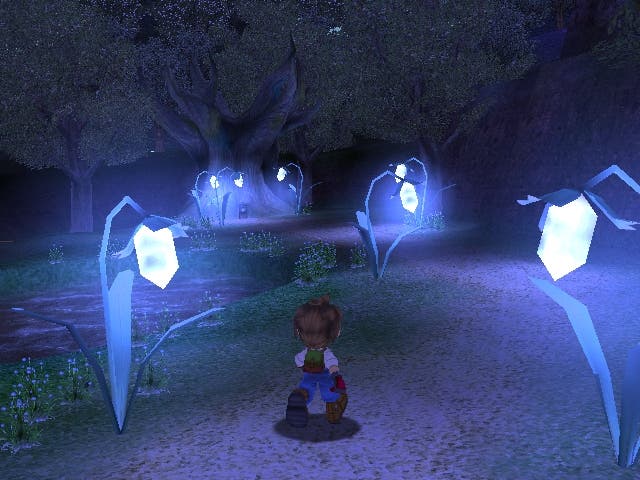
With the cows and horses also out to pasture and the turnips and strawberries watered, Roy wandered into town, stopping off at the local Inn to say hi to former squeeze Muffy, who had had to go once he realised she was flirting with just about anybody who would listen. Still - no reason not to be civil. Pausing outside again, he decided to set up a stall next door and try and sell a few fish, and maybe that old sickle he wasn't using. Nobody wanted the sickle, but the polite young business-lady Chris happened to buy some flowers on her way home, which was nice.
What a varied and memorable journey it is, full of quirky and intriguing characters - like Flora, who lives with the archaeologist Carter in a tent further inland, and constantly muses out loud that her completely platonic relationship could be misconstrued; or the pyrotechnic twins who live in a hut-on-stilts, and are always happy to play a little puzzly game of triangles to test your wits. Between chapters things change, too - people you know will die, people who stop by occasionally in the first year will actually move to the valley, and apart from simply having more options you'll also start to feel more like the valley lives on without your input. In your second season, Takakura even surprises you with a horse, enabling you to get around with greater ease on sunny days, and it's only the first of many changes that play a key part and help liven up an already spellbinding existence.
There are problems, of course, as there are with anything this ambitious, but they're all easily forgotten. With movement and camera controls split between the two analogue sticks, having to hold the A button and a direction on the left stick to push an animal whilst simultaneously tweaking the camera to move steadily is a peculiar concept; and some of the context-sensitive actions (dictated by the icon arrangement in the top right) could do with a little inertia - trying to milk a cow twice in a row upsets it, so it can be a pain when you hit A to brush her down and realise the function actually changed to 'milk' while you were lowering your thumb. The soundtrack also quickly loses its charm, and despite the ability to change LPs on your farm's player from time to time, you're unlikely to use it much beyond the first season.
There's also a nagging suspicion that this is quite a lazy PAL conversion, with some silly borders and no 60Hz mode, and it almost goes without saying that surround sound and widescreen options are off the menu. Fortunately it's not a game that lives or dies based on its technical competency, which is just as well, because it's not the best looking Cube game either. That said, the visuals certainly have a charming, cutesy sort of appeal that will likely resonate with most Nintendo fans, as borne out in the screenshots spread across this page. The developer's use of so many different levels of weather effects to simulate life in Forget-Me-Not Valley is far more worthy of praise though - very few games manage to nail so many different kinds of rain, from the light drizzly stuff right the way up the scale to blinding, thunderous rain that feels like it's going to wash the entire community out to sea. And then it starts to snow.
It is
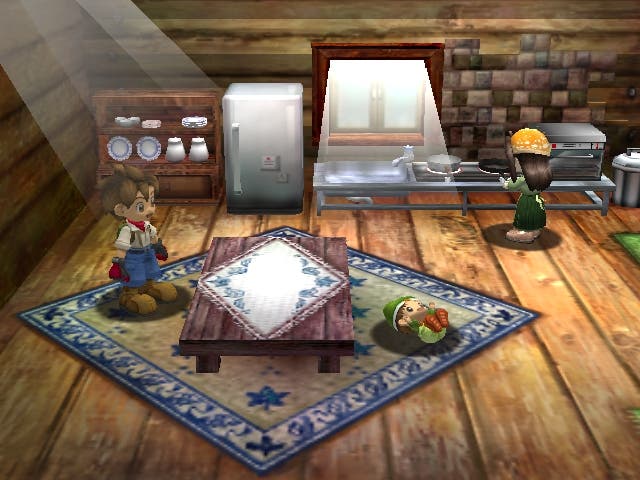
With the sun setting, Roy packed up and made his way home, filled up his dog's bowl, brought the livestock inside, fed them and then caught a quick soap opera on TV while mixing some recipes together to sell in town the following day. With that done, he wandered down to the mouth of the river for a late evening's fishing. It was nearly 9pm at this point, but Roy had a good feeling - his horoscope mentioned that an old person might prove lucky, and he'd given a pretty flower to an old lady with just that in mind earlier in the day. Sure enough, just as he was about to pack up at 11:30, he landed a Big Sharshark, worth 1200 bob to travelling salesman Van, and a clear vindication of his decision to go fishing. With that he might just buy that Seed Maker he'd been after. He was tired and a little hungry, sure, but as he trooped home in the dead of night, you could tell he was the happiest man in the whole world. He wasn't the only one smiling.
Overall, the appeal of Harvest Moon probably comes down to a mixture of world-envy, impressive balance, and the chance to craft your own life from the options laid in your path, whether you're cross-breeding cattle, cross-pollinating crops or just mixing your drinks and cooking soup. The tasks that make up those endless hours of gameplay aren't individually addictive, nor are they all particularly active in traditional gameplay terms, but each day taken as a whole is a rewarding experience, and it's very easy to sit down on the couch expecting to spend a few minutes trotting through the usual routine before dinner, only to be spurred into spending most of the night in front of it thanks to some seemingly spontaneous eruption of activity - like stumbling upon a party in the local hotel when you just wanted to talk to the chef about making a curry, or heading down to Gustafa's house and winding up staying for a musical get-together.
It's a life you'd want to live, and it's a truly refreshing escape from the pressures of reality into an imaginary utopia poised on the edge of an ocean. Long-term fans may bemoan the loss of harvest festivals, and there are some question marks over certain areas (and the GBA connectivity is worth little more than a few extra items), but in a world where everyone's happy to bank on erroneously labelled safest bets, this truly delivers exactly what it promises: A Wonderful Life. Take a chance and you'll soon understand.

